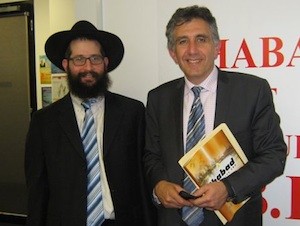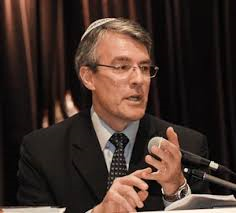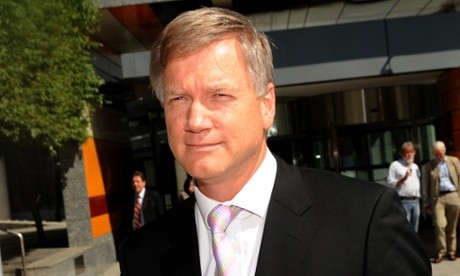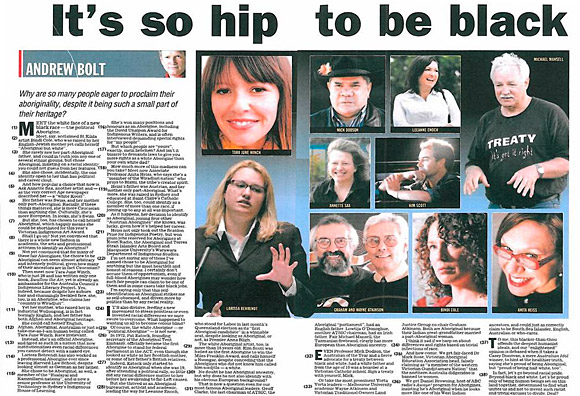The Jewish War on White Australia Continues
Brenton Sanderson

In my extended essay ‘The War on White Australia,’ I explored how Jewish intellectual movements and ethno-political activism were pivotal in ending the White Australia policy — a policy change opposed by the vast majority of the Australian population. Australian Jews take enormous pride in this achievement. For instance, the national editor of the Australian Jewish News, Dan Goldberg proudly acknowledges that: “In addition to their activism on Aboriginal issues, Jews were instrumental in leading the crusade against the White Australia policy, a series of laws from 1901 to 1973 that restricted non-White immigration to Australia.” The Jewish promotion of non-White immigration and multiculturalism in Australia has been (and continues to be) a form of ethnic warfare aimed at destroying Australia’s traditional White racial homogeneity — and with it supposedly any potential for a mass movement of anti-Semitism in Australia.
The history of multiculturalism in Australia (and indeed throughout the West) is in large part an object lesson in how a small but highly organised and motivated group of activists can successfully hijack the demographic destiny of a nation for its own ends. Acknowledging that Australian multiculturalism is first and foremost a manifestation of Jewish ethno-politics, Jewish historian William Rubinstein observed that: “Thus far, any serious questioning of multiculturalism has not resulted in an anti-Semitic backlash; nevertheless, the Jewish community would certainly be exceedingly disturbed by any basic reversal of the commitment to multiculturalism by successive governments.”[i] In addition to opening the floodgates to mass non-White immigration, a key part of this Jewish campaign to radically reengineer Australian society in their own interests has been to shut down speech critical of this immigration and multiculturalism — and particularly of the role of Jews in foisting these disastrous policies on a resentful White Australian population.
In Part 3 of my essay I discussed how, under the chairmanship (and behind the scenes influence) of the Jewish activist Walter Lippmann, the influential Committee on Community Relations delivered a report to the Australian Parliament in 1975 which placed “multiculturalism” at the heart of Australian government policy. It recommended that Australian social policy be formulated on the basis of four key elements. One of these recommendations, as summarised by the Jewish academic Andrew Markus, was that: “legislation was required to outlaw racial discrimination and uphold and promote rights through the establishment of a human rights commission.”[ii]
In response to this and the Committee’s other recommendations, which were essentially Lippmann’s recommendations, “multiculturalism” was adopted as official government policy in Australia in the 1970s, and extended under the Fraser [1975–1983] and Hawke governments [1983-1991] in the 1980s. Thus, in order to achieve the goals of multiculturalism, Jewish activists were determined from the beginning to bar and punish any speech that was critical of non-White immigration and multiculturalism. The new politically correct speech code was soon enforced by the weight of law with the enactment of racial and religious vilification laws that criminalized dissenting speech.

Professor Andrew Markus
Professor Markus proudly observes that: “Jews were amongst the leading advocates of the enactment and extension of racial vilification and anti-discrimination legislation by the federal and state parliaments.”[iii] In truth, the achievement of the twin Jewish goals of ending of the White Australia policy and instituting state-sponsored multiculturalism were attained with the passing of the Racial Discrimination Act of 1975 which stated: “It is unlawful for a person to do any act involving a distinction, exclusion, restriction or preference based on race, colour, descent or national or ethnic origin.”
In practical effect, the passing of the Racial Discrimination Bill in 1975 was the Australian equivalent of the drastic rewriting of American immigration law in 1965. In both cases, the gates were opened to a flood of non-white immigrants from the Third World with racial and cultural backgrounds very different from the majority European-derived population.
In her book Ideology and Immigration the Australian sociologist Katharine Betts states that the dismantling of the White Australia policy was the result of an elite conspiracy: “Public resistance,” she notes, “was circumvented by the use of administrative procedures and secrecy rather than open debate.” The final phase of the abolition, which involved the enactment of the Racial Discrimination Act by the Whitlam government (1972–75), was “a political victory” for the cosmopolitan elite, which, while failing to convert White Australia’s supporters “by reason and evidence,” left them “unconverted but outmanoeuvred.”[iv]
In the decades since the enactment of the Racial Discrimination Act in 1975, Jewish activists in Australia have continued to push for further legal restrictions on speech deemed contrary to their interests. In 1995 their activism, in the form of detailed submissions to the National Inquiry into Racist Violence and the Royal Commission into Aboriginal Deaths in Custody, succeeded in having section 18C inserted into the Act by the then Labor government. This radically restricted free speech in Australia by making it “unlawful to offend, insult, humiliate or intimidate another person or a group of people because of their race, colour or national or ethnic origin of the person or of some or all of the people in the group.” In doing so, Section 18C placed totalitarian limits on the freedom of speech in a nation traditionally regarded as one of the freest in the world. Almost anything you might say about race is likely to offend someone. Section 18D sets out some supposed exemptions to this radical restriction on free speech — stating that artistic works, scientific debate and fair comment on matters of public interest are exempt providing they are “said or done reasonably and in good faith.”
Crucially, unlike with defamation laws, the truth of a statement is irrelevant as to whether an individual is entitled to be offended or insulted under Section 18C. If a truthful statement about a particular race or ethnicity (which a judge believes was not made “in good faith” according to his own subjective interpretation) causes offence to someone who identifies with that race or ethnic group, the truth-teller can be punished under the Act.
Thus Section 18C places drastic restrictions on the freedom of speech of Australians. It should not need saying that any commitment to free speech is a commitment to allowing people to say and write things you dislike, that you detest, that you disagree with and find offensive. If the words spoken are words we all find congenial, then there is no need for any commitment to free speech.
The ideological nature of Section 18C of the Racial Discrimination Act was starkly illustrated in the case brought against conservative commentator Andrew Bolt. In 2009 Bolt wrote two columns pointing out that individuals with very small amounts of Aboriginal ancestry (or in some cases none) were taking advantage of a raft of government scholarships and affirmative action job vacancies by choosing to identify exclusively as Aboriginal. Bolt claimed these people were choosing to identify as Black to leverage their career and social advancement.
While Bolt did make some factual errors in these articles, his central proposition was entirely valid and later corroborated by the Australian Bureau of Statistics which, in commenting on the results of the 2011 Australian Census showing a 93,000 increase in the number of Aboriginal people between 2006 and 2011, observed that:
A change in people’s propensity to identify as being of Aboriginal and/or Torres Strait Islander origin is found to be a significant contributor to the increase in counts of Aboriginal and/or Torres Strait Islander people which cannot be attributed to measurable demographic factors. In particular, the large increase in the count of Aboriginal and/or Torres Strait Islander children aged 5–14 years in 2011 has been driven by a greater propensity of their parents to identify themselves and their children as being of Aboriginal and/or Torres Strait Islander origin in the 2011 Census when compared to the 2006 Census.
For pointing out this this rather obvious fact, and that this increasing Aboriginal self-identification had been encouraged by the multitude of financial and professional incentives available to those identifying as “Aboriginal,” Bolt was pilloried, hauled into court, and found guilty of violating the Racial Discrimination Act. In September 2010 nine of the “Aboriginal” people Bolt identified in his articles commenced legal proceedings against him and his employer the Herald-Sun. The complainants, who were represented gratis in the Federal Court by the Jewish barristers Ron Merkel and Herman Borenstein, sought an apology, legal costs and a gag on republishing the articles and blogs and “other relief as the court deems fit.” In the trial Merkel argued in reference to Bolt’s articles that “this kind of thinking led to the Nuremberg race laws’ and that Bolt had adopted a eugenic approach to Aboriginality.”
Australian Jewry has a long history of using Aboriginal activism as a political and ideological weapon in their broader war on White Australia. One Jewish source describes Jews and Aborigines as “two peoples with histories of dispossession and humiliation and killing who recognise each other, who find points of intersection and of parallel.” Australian Jewish leader and activist Mark Leibler claims to “have developed a deeper understanding of the connections between Indigenous and Jewish people and the underlying affinity we share. … We must listen to and respect the hard stories. Stories that are repeated all over Australia — stories of injustice, oppression and horror. Defiant stories of the proud survival of identifiable people. Stories resonating with familiar themes for each and every Jew.”[v] Speaking on behalf of Australian Jews Leibler claims that: “We’ve suffered 2,000 years of persecution and we understand what it is to be the underdog and to suffer from disadvantage.”
In his ruling for the complainants in 2011 the presiding judge Mordy Bromberg (also Jewish) declared that: “I am satisfied that fair-skinned Aboriginal people (or some of them) were reasonably likely, in all the circumstances, to have been offended, insulted, humiliated or intimidated by the imputations conveyed by the newspaper articles. … Even if I had been satisfied that Section 18C conduct was capable of being fair comment, I would not have been satisfied that it was said or done by Mr Bolt reasonably and in good faith.”
Thus “good faith” as interpreted by a judge is now the criteria for acceptable speech about race in Australia — with this to be determined by the likes of Justice Bromberg who is a prominent member of the Australian Jewish community. This point was not lost on Bolt himself who noted that “And which judge becomes relevant, doesn’t it? Or are we not allowed to suggest that, either?”

Justice Mordy Bromberg (on the right)
In light of Bromberg’s judgment, Bolt rightly concluded that: “This is a terrible day for free speech in this country. It is particularly a restriction on the freedom of all Australians to discuss multiculturalism and how people identify themselves.” Bolt later opined that: “Our laws against free speech are a disgrace. Aboriginal identity should not be a subject that cannot be discussed freely.”
Following the Bolt case there was a concerted push for the repeal of Section 18C from within conservative and libertarian circles in Australia. With the election of the Abbott Liberal government in September 2013, the repeal of section 18C became a potential reality with the new Attorney-General George Brandis promising to make repeal of section 18C of the Racial Discrimination Act a priority of the new government.
Unsurprisingly, this has prompted a massive campaign of resistance among Jewish intellectuals and activists. The Shadow Attorney-General and prominent Jewish lawyer Mark Dreyfus led the charge, calling on Tony Abbott to back away from a pledge to repeal Section 18C. Dreyfus says he condemned Senator Brandis’ plans, ”from the moment he first opened his mouth,” saying Section 18C “embodies Australia’s condemnation of racial vilification and protects our society from the poisonous effects of hate speech. When Senator Brandis says that repealing these laws is in the interests of freedom of speech, what he really means is freedom to engage in public hate speech.”
Dreyfus had earlier sent an open letter to the then Opposition leader Tony Abbott in which he argued that the Coalition’s stance on Section 18C of the Racial Discrimination Act is inconsistent with its support for the London Declaration on Combatting Anti-Semitism. Dreyfus insisted that Section 18C “is precisely the kind of legislated protection against anti-Semitism and discrimination that the London Declaration calls on its signatories to enact.”

Shadow Attorney-General Mark Dreyfus
Showcasing their contempt for democracy when it conflicts with Jewish interests, Jewish activists oppose the repeal of Section 18C regardless of the fact that Tony Abbott and the Coalition went to the September 2013 election pledging to repeal all or most of Section 18C of the act. During the election campaign Abbott had noted that “If we are going to be a robust democracy, … we’ve got to allow people to say things that are unsayable in polite company.”
Following Abbott’s electoral victory in September Australia’s Jewish leaders have stepped up their fight against any changes to the Racial Discrimination Act. Peter Wertheim, the Executive Director of the Executive Council of Australian Jewry, warned that the ”wholesale repeal” of sections of the act would encourage “more sinister forms of hate speech.” Wertheim claimed repealing the relevant section of the act, without any replacement, “would mean Australia was turning back the clock 15 years in complying with the convention against all forms of racial discrimination”. The executive director of the Australia/Israel Jewish Affairs Council, Colin Rubenstein, chimed in, maintaining that repeal of Section 18C would give “succor to racists.”
Noting organised Jewry’s vociferous opposition to the repeal of Section 18C, the hitherto philo-Semitic Andrew Bolt argued that “I believe Jewish community leaders now leading the charge to defend the RDA have seriously misread the lessons of their community’s tragic history. The Australia/Israel & Jewish Affairs Council … is profoundly wrong about this and is now publicly insulting people it privately supports.”
Bolt then turned his attention to the leadership of the AIJAC, noting that: “AIJAC chairman Mark Leibler is causing more harm than he realizes by sanctioning this vilification of people whose free speech his community and organization has relied upon. Mark, making me collateral damage in your campaign is something I cannot forgive.”
Bolt ostensibly feels entitled to some support from Jewish leaders after his many years of obsequious support for Israel:
Please do me the courtesy of not now trashing my reputation by smearing me as some kind of enemy of Israel or Jews just to win a debating point. I’ve dared say more in Israel’s defense in public than many Jews with a public profile. Drag me down in this debate and you only undermine one of Israel’s greatest supporters in the media. And you win only trash in doing so — laws even worse that the kind activists used to try to stop me from saying what I did … about anti-Israel boycotts. … I have risked my reputation to defend Israel from calumnies before a mob and a media only too keen to hear and spread them, and on national television.
Bolt was apparently under the delusion that his fawning support for Israel in the past entitled him to a degree of sympathy from organized Jewry in his backing for the repeal of Section 18C.
I have been particularly disappointed to be treated as collateral damage by Jewish community leaders and political players who have been demanding these illiberal laws be kept. Several have privately assured me they found the case against me a misapplication of the law or even an injustice. But not one publicly said so. Every one of them knows what a supporter I have been of the Jewish community, not just in print, yet not one publicly protested when a Jewish QC [Queen’s Counsel] told a Jewish judge in my case something far more foul than anything I had written — that my thinking resembled that of the Nazis who drew up the Nuremberg race laws. That obscene slur struck me as a legally sanctioned defamation. … But I believe the Jewish community — or those members involved in public advocacy — should reflect on whether principle here has been trashed for advantage by representatives who should know better.
One would hope that Bolt now realizes that organized Jewry have only one guiding principle: unconditional loyalty to their own ethnic group and its interests. Jewish leaders will readily throw a previously Jew-friendly commentator like Bolt under a bus if he strays off the reservation on issues of importance to Jews. Bolt can invoke his devotion to certain abstract principles all he likes — Jewish activists will continue to be exclusively guided by a ruthless and relentless self-interest.
Furthermore, they see threats to this self-interest anywhere and everywhere. Even Bolt’s mentioning above that the judge and prosecuting counsel in his case were Jewish provoked a hostile reaction: “I have been warned that some people are taking offence at my mentioning the religion of the judge and the barristers for the complainants. One Jewish community leader even had to wonder in an email to me if I was suggesting a “Jewish conspiracy.”

Andrew Bolt
Desperate to placate the Jewish activists now aggressively assailing him from every angle, Bolt adopted a more conciliatory tone, attempting to frame his opposition to Section 18C in terms more likely to appeal to them: Jewish self-interest:
I understand Jews fearing that too much free speech will unleash anti-Semitism — and I understand even better how much they have to fear from such racism, given the history of the last century. But they are drawing the wrong lessons from the rise of Nazism. The Nazis did not flourish because they had too much free speech. They flourished because their critics had none. Indeed, Germany had laws against Nazi hate-preaching before Hitler’s rise to power, and they made not the slightest difference (although, yes, they were weak and even more weakly applied). … Hitler even boasted of being censored to win support. Once the principle of such censorship was accepted, it was turned against everyone — and none more than the Jews of Germany.
Of course Jews are unlikely to be convinced by such arguments now that they enjoy a hegemonic position (politically, intellectually, culturally and financially) throughout the West. They know full well that free speech (and particularly the kind engaged in here at TOO) is not conducive to the preservation of this hegemony. Accordingly, Australian Jewry is pushing for ever more draconian laws against free speech. Thus in early 2013 it was reported that:
The Jewish Board of Deputies and the NSW Community Relations Commission are pushing for a radical overhaul of the laws in submissions to a parliamentary inquiry into whether it should be easier to criminally prosecute cases of serious racial vilification. … The Jewish Board of Deputies argues there is ‘’a serious gap’’ in the law and suggests a new offence of ‘’conduct intended to harass on grounds of race’’. The change would mean criminal prosecutions could be pursued over racial harassment that involves threats, intimidation or ‘’serious racial abuse’’, whether or not a physical threat is involved. The submission argues the maximum penalties should be a fine of $27,500 or two years’ imprisonment for individuals and fines of up to $137,500 for corporations. It also says the offence should be included in the Crimes Act, be subject to a jury trial and include online abuse.
The push by activist Jews for ever-tighter restrictions on free speech in Australia has been an important front in their broader war on White Australia. It has been a critical part of the suite of ideologies and policies that Jewish activists have deployed to ensure the dispossession and disempowerment of an increasingly imperiled White Australian majority. Of course this simply mirrors the tactics of organised Jewry throughout the West. These tactics have succeeded in putting White people under demographic and cultural siege from race-replacing levels of Third World immigration and the official embrace of multiculturalism — with all resistance to this being suppressed by ever-harsher restrictions on freedom of speech.
REFERENCES
Leibler, M. (2006) ‘Crossing the Wilderness: Jews and Reconciliation,’ In: New Under the Sun — Jewish Australians on Religion, Politics & Culture, Ed. Michael Fagenblat, Melanie Landau & Nathan Wolski, Black Inc., Melbourne. pp. 316-324.
Markus, A. (2006) ‘Multiculturalism and the Jews,’ In: New Under the Sun — Jewish Australians on Religion, Politics & Culture, Ed. Michael Fagenblat, Melanie Landau & Nathan Wolski, Black Inc., Melbourne. pp. 93-107.
Rubinstein, W.D. (1995) Judaism in Australia, Australian Government Publishing Service, Canberra.
Tavan, G. (2005) The long, slow death of White Australia, Scribe Publications, Melbourne.
[i] Rubinstein p. 476
[ii] Markus p. 95
[iii] Markus p. 101
[iv] Tavan p. 3
[v] Leibler p. 316 & 323
http://www.theoccidentalobserver.net/2014/01/the-jewish-war-on-white-australia-continues/
Views: 3
 RSS Feed
RSS Feed

















 January 29th, 2014
January 29th, 2014  FAKE NEWS for the Zionist agenda
FAKE NEWS for the Zionist agenda 

 Posted in
Posted in  Tags:
Tags: 
















